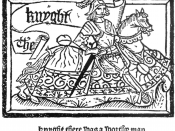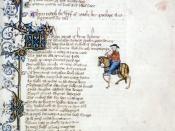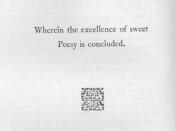When a person is infatuated with something, they can become single-minded and ignorant to reality. If they cannot have the object of their desire, they may be plunged into a state of despair and frustration. Sir Philip Sidney explores the affects of desire in his sonnets, Astrophil and Stella. Geoffrey Chaucer also delves into the topic in ÃÂThe Wife of BathÃÂs Prologue and TaleÃÂ. These two works present the idea that desire is ultimately a negative force in a personÃÂs life.
In the ÃÂWife of BathÃÂs Prologue and TaleÃÂ, Chaucer depicts sexual desire as well as other forms of desire as a feeling that causes misery and dissatisfaction. The Wife of Bath states in the Prologue repeatedly that women desire what they cannot have. She says, ÃÂWaite what thing we may nat lightly have, Therafter wol we crye al day and craveÃÂ (Lines 523-24). In addition, if something is too readily available, it will become undesirable to a woman: ÃÂPresse on us faste, and thane wol we flee.ÃÂ
(526). These statements imply that once a person has what they previously desired, they will no longer desire it because they are able to have it. If a thing is truly desirable only because of its distance and impossibility, then nobody will ever be satisfied. Either they are in a state of constant lust or a state of dissatisfaction, because what they desire is not something that they really want access to.
SidneyÃÂs take on desire differs slightly from Chaucer, but in the end paints a similarly shoddy picture of it. The narrator of the sonnets (Astrophil) tells a story of an intrusive, destructive kind of love. To the object of his desire, he says, ÃÂin my woes for thee thou art my joy, And in my joys for thee my only annoy.ÃÂ (Sonnet 108, Lines 13-14). These words depict feelings of both happiness and despair because of his love- a confliction that is distressing and painful for him to experience. Stella represents the ideal Petrarchan woman, and in fitting with this ideal, she is virtuous and unattainable. He desires her because she fits this mold; if she were attainable, he would not want her, for she would not be ideal. Just like the Wife of Bath, Astrophil is always lusting after something he cannot have. Her chastity and virtue make her desirable, but in this sonnet cycle, the two are constantly at odds with one another. In sonnet 71, he says, ÃÂthy beauty draws the heart to love, As fast thy Virtue bends that love to good, ÃÂBut, ah,ÃÂ Desire still cries, ÃÂgive me some food.ÃÂÃÂ (S71, L12-14) Essentially, her beauty makes him want her, her virtue makes him love her, but he still desires physical satisfaction, which he knows she cannot give him. Once again, it is a no-win situation.
Chaucer also explores the idea that desire leaves a person stupid and easy to manipulate. The Wife confesses to using the desire that men feel for her to her advantage. She confesses to using sex in order to manipulate them into giving her their ÃÂlandÃÂ and ÃÂtresorÃÂ (210). Love was not present in at least three of her marriages, and she admits that ÃÂin bacon hadde [she] nevere delit.ÃÂ (422-24). Yet she engaged in sexual acts with her husbands just so that they would give her what she wanted. The husbands, their perceptions dulled by lust, fall for her every trick. In this way, desire can leave you naively ignorant of the reality of your situation, or simply willing to ignore it. This leaves you vulnerable to the abuse of others.
Unlike the Wife of Bath, the narrator of SidneyÃÂs sonnets is less willing to accept his state of blind love. He speaks at length about his attempts at resisting its effects. The language used to describe it in sonnet 2 is not happy or warm; ÃÂLove gave the wound, which while I breathe will bleed.ÃÂ (L2). He refers to himself as a ÃÂslave-born MuscoviteÃÂ (L10), suffering under ÃÂtyrannyÃÂ, (L11) and compares the way he is living to ÃÂhellÃÂ (L14). Such negative, and frankly rather frightening, terms give the reader a clear idea of what desire really feels like. It is not enjoyable or voluntary, it is forced upon him by a ÃÂmurthÃÂring boyÃÂ (S20, L2) - namely, Cupid, the god of love, a trickster who toys with human emotions. In sonnet 72, he expresses a will to get rid of his feelings: ÃÂDesire, because thou wouldst have all, Now banished art. But yet alas how shall?ÃÂ (L13-14). He has no idea how to proceed in the banishing because desire has taken such complete control of his life, which it appears to do in ChaucerÃÂs work as well.
The Wife in ChaucerÃÂs Prologue says that her fifth husband, which she ÃÂtook for love and no richesseÃÂ (532) was consistently abusive to her. She remains in a relationship throughout which she is criticized and hurt on a regular basis. Yet since she sexually desires him, she forgives all of his severe flaws; ÃÂThat though he hadde me bet on every boon, He coulde winne again my love anoon.ÃÂ (517-18). She claims to love him more than any of her other husbands for this very reason- that he was hard to obtain, hard to tame and hard to please. Again, touching upon the notion that women want what they cannot have. Her lack of common sense and care for her personal well-being is a prime example of the detrimental affect lust has on a personÃÂs mind.
All of this presents the idea that desire is not something you can opt in or out of, but that it is something that takes control of your psyche and dominates your life. It leaves you dumb, ignorant, depressed, vulnerable and frustrated. As both works suggest, people desire what they cannot have, and that is not good for the spirit, mind or body.
Sources CitedChaucer, Geoffrey. ÃÂThe Wife of BathÃÂs Prologue and Tale.ÃÂ The Canterbury Tales. The Norton Anthology of English Literature, The Major Authors. Eighth Edition Ed. Stephen Greenblatt. New York: Norton, 2006.
Sidney, Sir Philip. ÃÂAstrophil and Stella.ÃÂ Norton Anthology of English Literature, The Major Authors. Eighth Edition Ed. Stephen Greenblatt. New York: Norton, 2006.
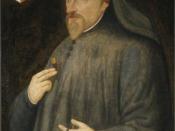
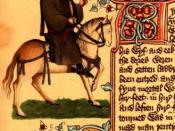
![[Portrait of Abe Most, Pete Ponti, Sid Jacobs, and Jimmy Norton, Hickory House, New York, N.Y., ca. June 1947] (LOC)](https://s.writework.com/uploads/9/94582/portrait-abe-most-pete-ponti-sid-jacobs-and-jimmy-norton-hi-thumb.jpg)
